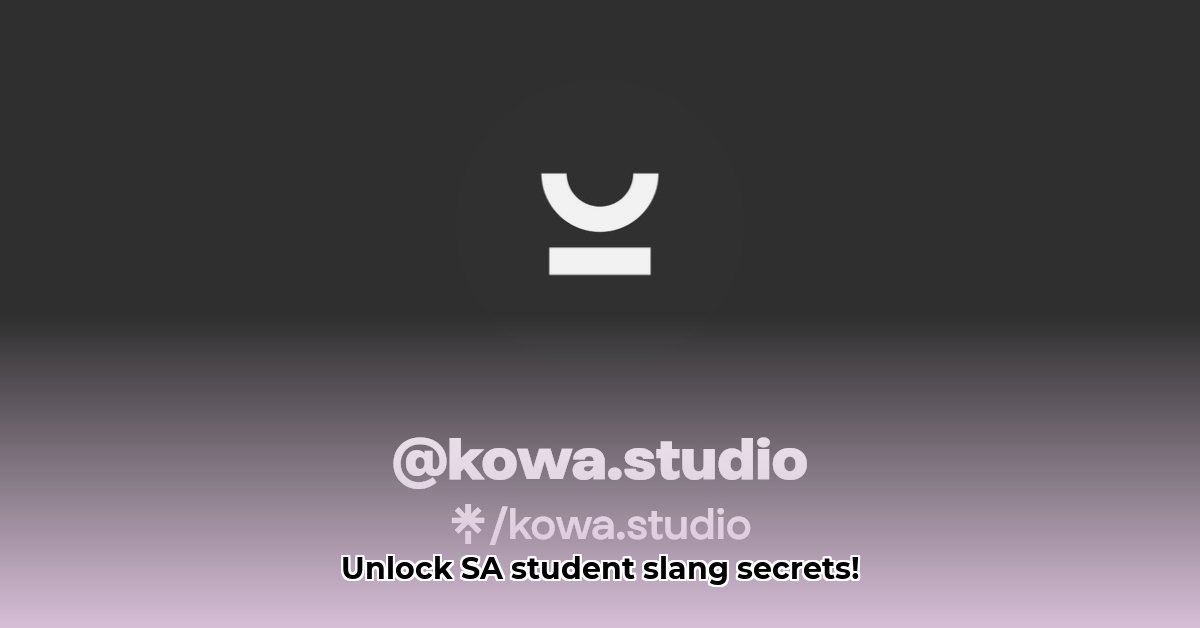
Kowa Betekenis: Cracking the Code of South African Student Slang
Ever tried chatting with South African students and felt completely verlore? (lost) Their slang can be a real moerse (huge) challenge! This guide helps you decode the vibrant, ever-changing language of SA university students – unlocking “kowa betekenis” (what it means). For more on South African education, check out this helpful resource.
The Secret Language of Students: How Slang Works
Student slang isn't random; it's a creative reflection of youth culture. It's a way for students to connect and forge a sense of belonging, a linguistic in-group. Think of it as a living, breathing thing, constantly evolving, borrowing from various sources and reinventing itself. Words get shortened (like “braai” for “braaivleis”), combined to form new terms, or given entirely new meanings. This often involves blending elements from different South African languages—isiZulu, isiXhosa, Afrikaans, and English — creating a truly unique linguistic tapestry.
Kowa Betekenis and the South African Mix
Unfortunately, there's no single dictionary for SA student slang. But we can uncover patterns. South Africa’s diverse linguistic landscape heavily influences student speech, resulting in a dynamic mix of cultural references and linguistic innovations. Words might be directly borrowed from other languages or creatively combined. Think of how student protests or shifts in university policies can directly impact the language used – slang serving as a barometer of student experiences and concerns. What does a particular slang term reveal about the issues students currently face?
Decoding the Jargon: Practical Steps to Understanding Student Slang
Ready to become fluent? Here's a step-by-step guide:
Immerse Yourself: Listen actively! Hang out with students, observe their interactions, and pay attention to their speech. The more you listen, the more you’ll pick up.
Ask Away: Don’t be shy! Politely ask for clarification if you hear an unfamiliar word. This shows respect and is the quickest way to learn.
Tap into Online Communities: Social media, forums, and student groups are treasure troves of slang. Remember: context is key! A word's meaning can vary greatly depending on the group.
Look for Patterns: Note recurring themes. Are words shortened or combined? Are there commonly used metaphors? Identifying patterns helps decipher related words.
Location Matters: Slang varies by region and university. A term popular at one varsity might be unknown at another, even in the same city.
Who Benefits from Understanding Student Slang?
Understanding student slang isn’t just fun; it’s beneficial for various groups:
- Students: Improved communication, stronger social inclusion, a better sense of belonging.
- Educators: Enhanced student engagement, deeper understanding of student experiences, more effective communication.
- Researchers: Rich data for sociolinguistic studies, insightful understanding of youth culture.
- Businesses: More effective marketing campaigns targeted towards students; better understanding of their needs and preferences.
The Future of South African Student Slang Research
Research into SA student slang is largely untapped. Further research should focus on:
- Extensive Data Collection: Larger-scale studies are needed to gather a broad representation of slang across the country.
- Linguistic Deep Dive: Detailed analyses are necessary to understand the how and why of slang formation – the linguistic processes involved.
- Contextual Understanding: Research needs to explore how social and political contexts shape student slang.
By collaborating and using diverse research methods, we can gain a richer understanding of “kowa betekenis” and the dynamic world of SA student slang.
How to understand and use common South African university slang
Key Takeaways:
- SA university slang blends languages, creating a unique linguistic landscape.
- Understanding it improves communication and cultural appreciation.
- Context is crucial; meanings vary depending on the situation.
- Responsible use avoids offense - some slang can be hurtful.
- Learning takes time; don't be discouraged!
Cracking the Code: Common University Slang
Here are some common terms to get you started:
- "Lekker": Means more than "nice"—it conveys enjoyment, approval, and excitement.
- "Braai": More than a barbecue; it's a social event, symbolising community.
- "Varsity": Shorthand for "university," universally understood on campuses.
- "Rus": (Afrikaans for "rest") means a break, a study session, or relaxation.
- "Tjop": A great deal, a bargain, a steal.
Context is King (and Queen!)
Many words have flexible meanings. "Just now" can mean immediately or much later. Pay attention to tone and body language.
Beyond the Basics: Diving Deeper
To master SA student slang, immerse yourself in the culture. Chat with students, observe, and ask questions.
Respectful Language: Navigating Sensitive Territories
Some slang can be offensive. Be mindful and choose words carefully. Observe how others use it.
Resources and Further Exploration
While dedicated resources on SA university slang are limited, broader South African slang resources can serve as a starting point. Continued research is needed.